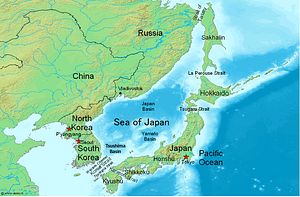In a sign that China is looking to increase its leadership role in regional security, Beijing invited the defense chiefs of South Korea, North Korea, and Japan to the Xiangshan Forum regional security conference later this year. The conference will be organized by the Chinese Defense Ministry and will take place from November 20 to 22. The Xiangshan Forum is a bi-yearly track-II defense exchange that mostly involves defense scholars. During its last iteration, in November 2012, over 60 defense experts from 21 states were present. Beijing’s decision to invite regional defense chiefs to this year’s conference is a first for the forum whose theme will be “cooperation and win-win, build Asian community of destiny.”
According to a South Korean government source who spoke to Yonhap News, China sent invitations to “South Korean Defense Minister Han Min-koo, North Korean Defense Minister Hyon Yong-chol and Japanese Defense Minister Itsunori Onodera.” The Xiangshan Forum remains fairly obscure owing to its relatively small size and track-II status, but it looks like Beijing is attempting to transform it from an academic exchange “into a high-profile security and defense forum.” Indeed, in comments earlier this year, Chinese Ministry of Defense spokesman Yang Yujun noted that the Xiangshan Forum will be “upgraded” this year, though he did not specify how. By inviting top regional defense officials, we now have a better idea of how Beijing sees the future of the forum.
In many ways, what Beijing is doing with the Xiangshan Forum resembles a China-hosted version of the Shangri-La Forum (a track 1.5 security summit hosted annually by the International Institute for Strategic Studies). The Xiangshan Forum is supported by the Chinese Defense Ministry but is hosted and organized by the China Military Sciences Society (CMSS), a government-affiliated academic organization. Beijing has been taking the initiative with security multilateralism in Asia under President Xi Jinping who sees the Shanghai Cooperation Organization (SCO), the Conference on Interaction and Confidence-Building Measures in Asia (CICA), and other China-led groupings as the future of a security order that reflects an “Asia for Asians,” sidelining the United States and its allies in the process.
Beijing’s decision to invite officials from across the region comes after the first trilateral meeting between high-level Chinese, Japanese, and South Korean in 11 months. If both the South Korean and Japanese defense ministers attend this forum, it would represent the second high-level trilateral exchange between China, Japan and South Korea in a two month span. Additionally, at last week’s trilateral meeting, which took place at the deputy foreign minister level, all three countries agreed to hold a trilateral summit before the end of the year. These developments could signal that the once-moribund Northeast Asian diplomatic scene could temporarily spring back to life.
































